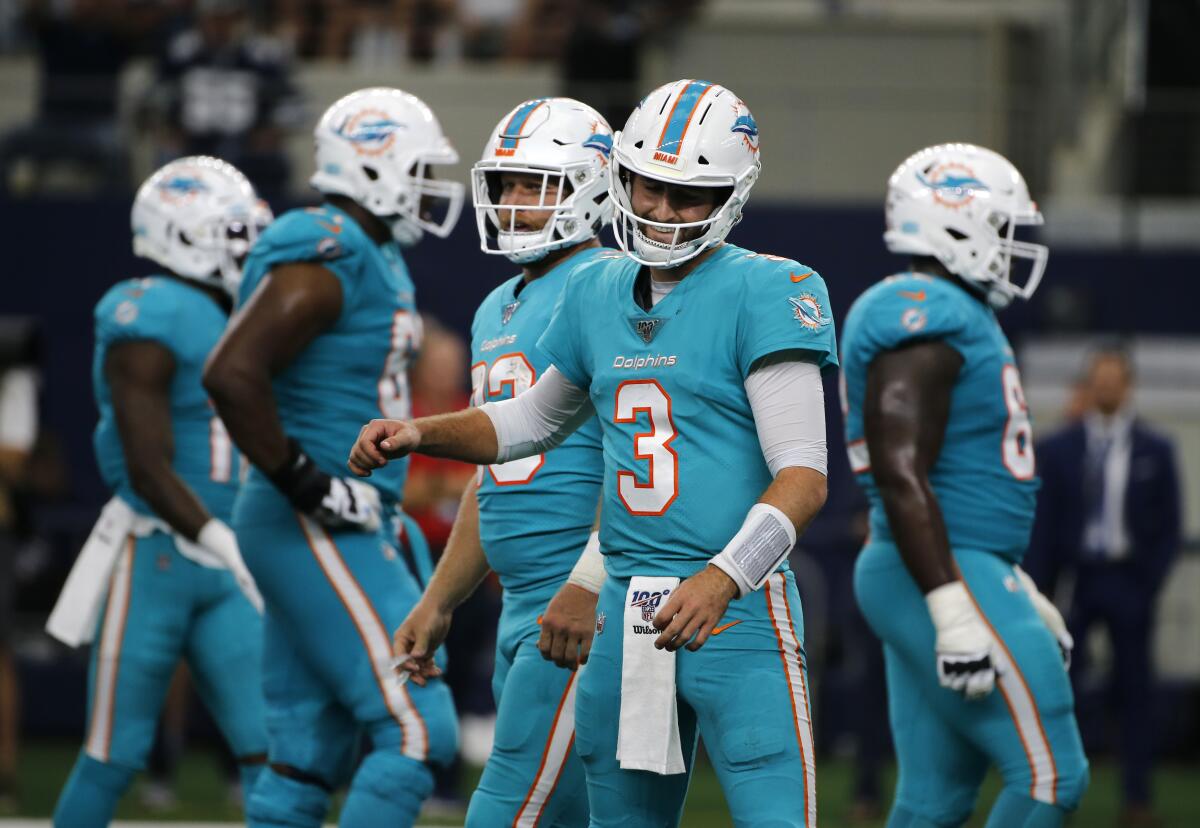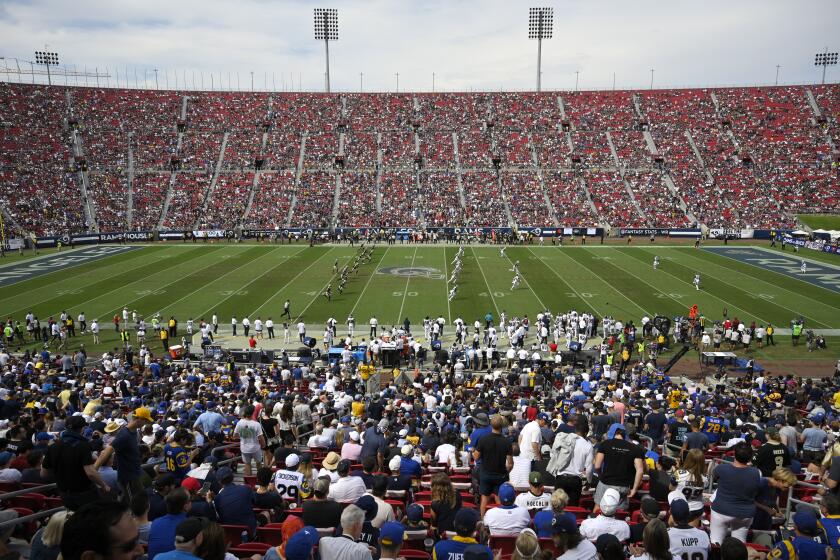Ask Farmer: Do players ever get fined by their teams for false starts or offsides penalties?

- Share via
Have a question about the NFL? Ask Times NFL writer Sam Farmer, and he will answer as many as he can online and in the Sunday editions of the newspaper throughout the season. Email questions to: sam.farmer@latimes.com
Do players ever get fined by their teams for false starts or offsides penalties?
Rocky Hill, Point Richmond, Calif.
Farmer: Do they get fined? Not officially, but I’ll explain.
There’s a very specific code of conduct, fine schedule and procedure associated with fines that’s collectively bargained between the NFL and NFL Players Assn., so teams can’t just assess fines willy-nilly. So, for instance, if a player throws the football into the stands, the fine is $7,017 for a first offense. If he makes a horse-collar tackle, it’s $21,056 for a first offense, and so forth.
There are no such agreed-upon fines for false starts or offsides penalties.
But that doesn’t mean they don’t come with a cost. A lot of teams have an unofficial kangaroo court, especially among offensive linemen, that fines players for all types of infractions, varying from the somewhat serious (on-field mistakes) to the downright silly annoyances and pet peeves.
Former NFL guard Mark Schlereth participated in an elaborate fining arrangement in Denver, when he and his teammates would penalize one another if they were ever quoted by name in media reports. That’s how it started, at least.
“After a while, there were fines for literally everything,” he said. “It was always lighthearted. It was fun. It you resisted paying, it would just make it that much worse. You just shut your mouth and paid the fine. Because if you complained about it, we’d just find 27 other things to fine you on, and we’d just start making stuff up.”
At the end of the season, the linemen would take all that fine money, which was in the thousands of dollars, and have a big, expensive dinner in town.
There was a similar arrangement when Nick Hardwick played center for San Diego, and the Chargers would use that money for charity, which sometimes was a Christmas shopping spree for underprivileged kids.
“Passing gas in the meeting room was $10,” Hardwick recalled. “Rookies forgetting to take care of the veterans on Fridays with some kind of doughnuts was a $50 fine. Offsides or a false start was like $10 during the week, but $50 on a weekend. A holding penalty was $100. So was a sack. Those were the steepest.”
Schlereth and Hardwick said their offensive lines issued fines for players clapping their hands in frustration for making a mistake.
“Clapping was the worst,” Hardwick said. “That’s still a pet peeve of mine. I drive that into my kids, like, ‘You see that guy clapping right there? That is wrong. Don’t do that.’ We all know you made a mistake. You don’t also have to let us know you care by clapping. We just assume you care.
“That doesn’t drive anybody but an offensive line coach wild. I haven’t ever heard anybody on the outside comment on somebody clapping like that. But offensive line coaches hate that. It drives them nuts. The very first day they see a kid do that, they’re like, ‘Absolutely not.’”
That’s a $50 fine. Nothing to be applauded.
The NFL has all but phased out one of its most exciting plays – the kick return – with about three out of four kickoffs now resulting in touchbacks.
::
Something confuses me about clock management. On one play when a player runs out of bounds with the football, the clock stops and doesn’t start again until the ball is snapped on the next play. Then, on another play after a player runs out of bounds, the clock stops briefly but restarts when the ball is made “ready for play.” Why the difference?
Tom Bruzda, Wildomar
Farmer: For this I turned to former NFL referee Mike Carey:
“That’s a good question, Tom. If the only reason the clock was stopped was for a ballcarrier running out of bounds on a scrimmage play, the clock is to be restarted when the ball is set on the ground for the next play. This rule was put in place to shorten game time. That’s why officials don’t wait too long to spot the ball.
“However, inside two minutes left in the first half and five minutes left in regulation, the ball will start on the snap if the ball carrier runs out of bounds. This exception allows for more plays in what is typically the most dramatic and exciting part of the game.”
More to Read
Go beyond the scoreboard
Get the latest on L.A.'s teams in the daily Sports Report newsletter.
You may occasionally receive promotional content from the Los Angeles Times.












